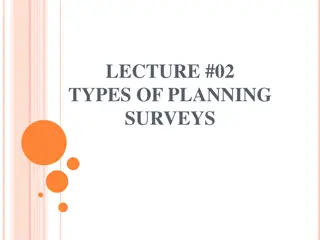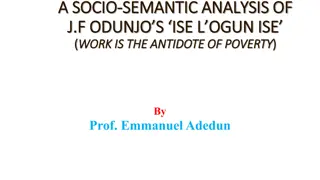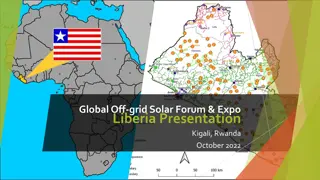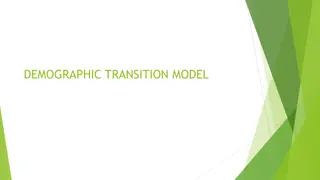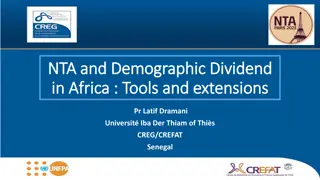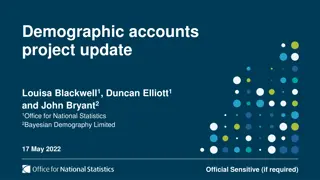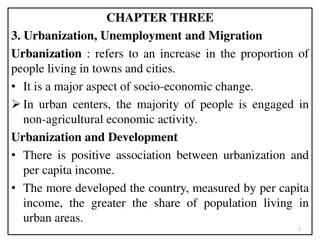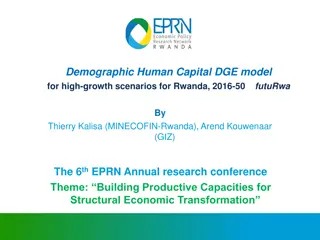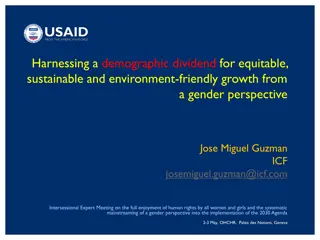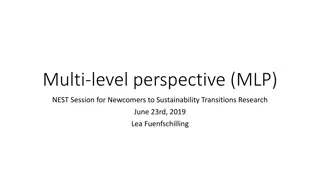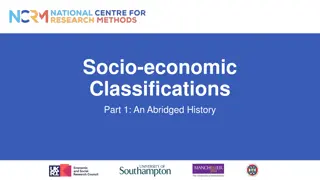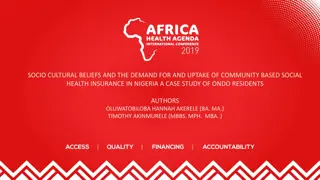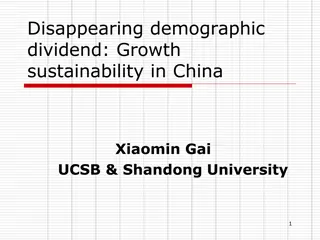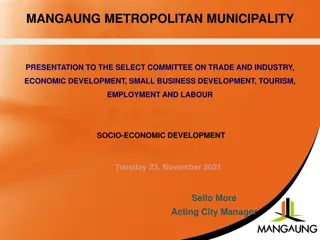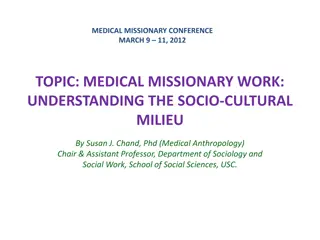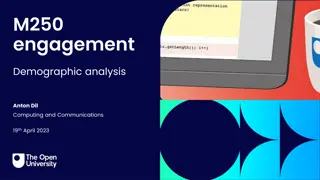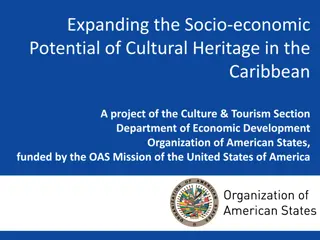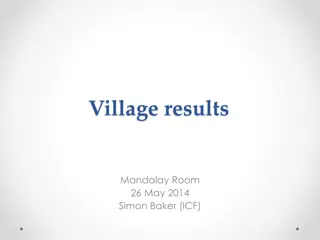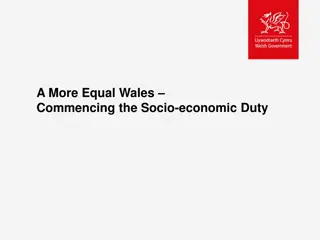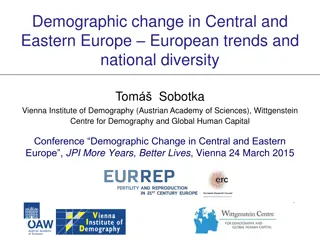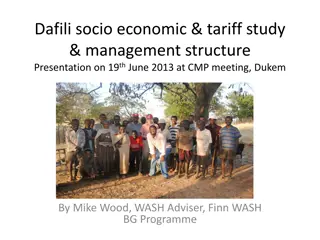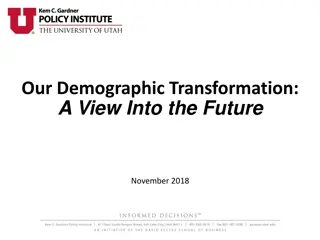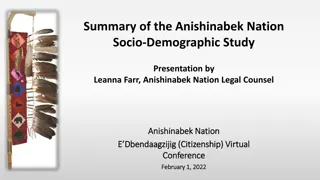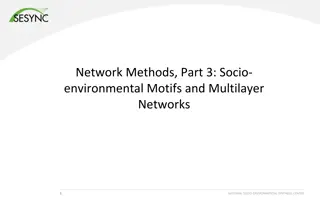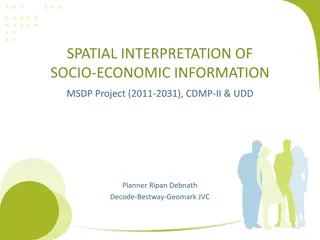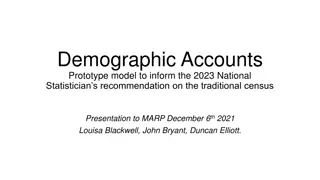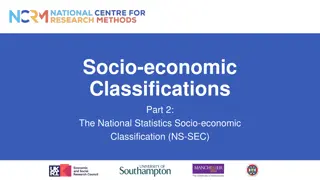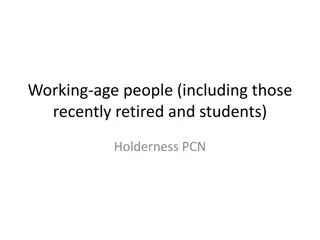Integrated Performance Data: Provincia…Delivery & Socio-Economic Trends
The 4th quarter performance and pre-audited financial outcomes for the 2022/23 financial year. It includes an overview of socio-economic and performance trends, financial performance analysis, and delivery trends. The report highlights key indicators such as youth unemployment rate, education outcom
0 views • 31 slides
Understanding Sustainable Business Models in the Context of Open Data and Socio-Economic Perspectives
Explore the intricate interplay between sustainable business models, open data practices, and socio-economic perspectives presented by Andrew Coote. Delve into the impacts, assessment methods, and the importance of data accessibility in decision-making. Gain insights into the FAIR principles and the
1 views • 16 slides
Understanding the Purpose and Origin of YESAA Legislation
YESAA, the Yukon Environmental and Socio-economic Assessment Act, was developed in collaboration with Yukon First Nations to ensure environmentally and socially responsible project assessments. The Act, passed in 2003, aims to protect environmental quality, heritage resources, and the well-being of
3 views • 19 slides
Types of Planning Surveys for Urban Development
Planning surveys play a crucial role in urban development by categorizing various types of surveys like Land Use, Housing, Socio-economic, and Transportation surveys. Each survey type serves a specific purpose, such as determining land allocation, studying housing conditions, assessing socio-economi
1 views • 17 slides
Socio-Semantic Analysis of J.F. Odunjo's "Ise L'ogun Ise" and Yoruba Cultural Values
Societal values, cultural identity, and the impact of linguistic forms on social meaning are explored in this study. Through an analysis of J.F. Odunjo's poem "Ise L'ogun Ise" and Yoruba socio-cultural values, the study aims to address the decline in moral standards and societal ethos, advocating fo
0 views • 35 slides
Socio-economic Overview and Energy Access in Liberia
This presentation provides a comprehensive overview of Liberia's socio-economic landscape, energy access challenges, and climate change targets. It covers key data such as GDP, population, sectoral contributions, access rates, renewable energy targets, and more. The country aims to achieve 100% elec
0 views • 14 slides
Understanding the Demographic Transition Model
The Demographic Transition Model describes the shift from high birth and death rates to low rates as societies advance technologically and economically. It consists of four stages, each marked by specific characteristics and factors influencing population growth. From high mortality and fertility ra
3 views • 12 slides
Understanding the Socio-Cultural Impacts of Tourism
The socio-cultural impacts of tourism on host communities can be both positive and negative. Tourism can influence local identities, values, and traditions, leading to changes in behavior and community structures. While tourism can create job opportunities and foster cultural pride, it may also resu
0 views • 28 slides
Tools and Extensions for NTA and Demographic Dividend in Africa
This content discusses the tools and extensions related to National Transfer Accounts (NTA) and Demographic Dividend in Africa, focusing on quantifying domestic production, consumption, and progress in harnessing demographic dividend. It includes NTA profiles for African countries, NTTA profiles for
2 views • 10 slides
Progress Update on Demographic Accounts Project for June 2022 Delivery
The update covers the progress of the Demographic Accounts project, including proof-of-concept milestones, annual local authority level estimations, model approaches, and data preprocessing. The project aims to deliver demographic accounts by age, sex, and local authority, incorporating data from va
0 views • 15 slides
Urbanization, Unemployment, and Migration: Impact on Socio-Economic Development
Urbanization, a key factor in socio-economic change, is linked to per capita income growth. The association between urbanization and development is evident worldwide, with rapid urban growth in developing countries. In Africa, high rural-urban migration and urban fertility rates drive urbanization.
3 views • 31 slides
Understanding Socio-Cultural Factors of Abnormal Behavior in Psychology
Exploring the impact of socio-cultural factors on abnormal behavior, this article delves into the influence of societal pressures, cultural norms, and economic status on mental health. The socio-cultural model emphasizes how societal criteria shape perceptions of abnormality, highlighting the role o
0 views • 7 slides
Demographic Human Capital DGE Model for High-Growth Scenarios in Rwanda
This study focuses on a Demographic Human Capital Dynamic General Equilibrium (D-DGE) model for analyzing high-growth scenarios in Rwanda from 2016 to 2050. It explores the interactions of demographic dynamics, human capital, public infrastructure, and debt within a long-term growth framework. The m
0 views • 28 slides
Harnessing a Demographic Dividend for Equitable Growth: A Gender Perspective
Harnessing a demographic dividend involves leveraging a decrease in fertility rates to shift the population towards a larger working-age group, reducing dependency ratios and creating opportunities for economic and social investments. This process requires the right policies and frameworks. The 3 Es
0 views • 11 slides
Understanding Technological Innovation & Sustainability Transitions through Multi-Level Perspective (MLP)
Delve into the history and development of technological innovation from a socio-technical perspective, exploring concepts like niches, regimes, and landscapes. Learn from early references and key researchers such as Kemp, Schot, and Geels about transition pathways, regime shifts, and sustainable dev
0 views • 8 slides
Evolution of Socio-Economic Classifications: A Historical Overview
Tracing the evolution of socio-economic classifications from Registrar General's Social Class in 1913 to National Statistics Socio-economic Classification in 2020, highlighting key changes and terminologies over the years.
0 views • 6 slides
Exploring Socio-Cultural Beliefs Impact on Community Health Insurance in Nigeria
In Nigeria, the demand for Community Based Social Health Insurance Programs (CBSHIP) is influenced by socio-cultural beliefs. This case study conducted in Ondo Residents delves into the challenges and opportunities faced in ensuring universal health coverage, particularly in rural areas. By examinin
0 views • 13 slides
Challenges and Opportunities in China's Demographic Dividend
China's rapid economic growth was fueled by its demographic dividend, but it now faces challenges such as population aging, rising labor costs, and avoiding the middle-income trap. The country has transitioned to a "new normal" of slower growth, structural changes, and evolving growth drivers. Under
0 views • 63 slides
Mangaung Metropolitan Municipality Socio-Economic Development Presentation
The presentation to the Select Committee covers the socio-economic intelligence of Mangaung Metropolitan Municipality, highlighting the challenges faced such as the ailing economy, load-shedding, and COVID-19 impact. It explores risks to the outlook at national and provincial levels, examines driver
0 views • 33 slides
Socio-Economic Impacts of Offshore Wind Farm Projects: A Study on Marine Renewable Energy
The paper presented at the IAIA Brisbane Session delves into the socio-economic impacts of Offshore Wind Farm (OWF) projects, focusing on the EU context, the range of impacts, research methodologies, and predicted versus actual impacts. The study reviews Environmental Statements (ESs) and case studi
0 views • 12 slides
Demographic Comparison for Representativeness in Oregon ACT Program Evaluation Focus Groups
The study evaluates the representativeness of focus group samples in the Oregon ACT Program. It compares demographic characteristics such as age, gender, race/ethnicity, medication use, and days homeless between the entire ACT population and focus group participants. The findings show differences in
0 views • 28 slides
Global Best Practices for Optimizing RE/EE Socio-Economic Impacts
The SE4JOBS Project aims to identify and analyze global best practices in optimizing socio-economic impacts through RE/EE deployment in developing and emerging countries. By examining key variables and causal relationships, the project seeks to inspire policy debates and decision-making processes to
0 views • 10 slides
Exploring Solidarity, Good Causes, and Socio-Spatial Identity
Delve into the concepts of solidarity, choosing a good cause for fundraising, and socio-spatial identity in a project setting. Discuss the proximity factor in determining solidarity, analyze decisions regarding sponsorships for projects focusing on women, children, health, or nutrition in varying ge
1 views • 24 slides
Socio-Economic Projections for Kigali City: 2013 Master Plan Update
The IPAR Research Conference held on 19th June 2019 and presented by Brian Kiberu showcased the socio-economic projections for Kigali City from 2018 to 2050 as per the 2013 Kigali Master Plan update. The research covered population dynamics, labor market characteristics, GDP growth, economic activit
1 views • 37 slides
Understanding Socio-Affective Development in Infants and Children
Socio-affective development focuses on how individuals interact with others and manage their emotions. It is influenced by factors such as personalities, morality, emotions, and spirituality. Attachment theory, proposed by John Bowlby, explains how infants form relationships with caregivers, startin
0 views • 16 slides
Understanding Medical Missionary Work in Socio-Cultural Context
Living in a time of lifestyle diseases, it is crucial to understand the significance of medical missionary work in addressing health issues, combining soul and body care. Exploring the socio-cultural milieu, this conference emphasizes learning from Christ's people-centered approach to reach those in
0 views • 45 slides
Demographic Analysis and Changes in M250 Module Engagement
The M250 module underwent significant changes in 2021, introducing a new curriculum with practical activities and automated feedback features. The demographic analysis revealed a majority of students aged 25-34, with completion rates varying across different demographic groups. Overall, students fou
1 views • 28 slides
Enhancing Caribbean Cultural Heritage for Socio-Economic Development
A project by the Culture & Tourism Section, OAS, aims to expand the socio-economic potential of Caribbean cultural heritage. Objectives include promoting sustainability, conservation strategies, and fostering local traditions. Initial steps involve conducting surveys and identifying priorities such
0 views • 12 slides
Socio-economic Data Analysis of Selected Villages in Mandalay
This report presents detailed socio-economic data from selected villages in Mandalay, including information on ethnicity, religion, socio-economic background, availability of electricity, civil society groups and activities, source of credit, and water sources. The data provides insights into the de
0 views • 8 slides
Understanding Demographic Overlay Reports for Education Accountability
Demographic Overlay Reports play a crucial role in education accountability by certifying student demographics for assessment purposes. This report, sourced from district Student Information Systems (SIS), requires careful review to ensure accurate data transmission to the assessment platform. Any d
0 views • 15 slides
Promoting Equality in Wales: Implementing the Socio-economic Duty
The Welsh Government is prioritizing equality and human rights, especially in the context of Brexit, by commencing the socio-economic duty outlined in the Wales Act 2017. This duty requires specified public bodies to consider how their decisions can reduce inequalities associated with socio-economic
0 views • 13 slides
Demographic Shifts in Central and Eastern Europe Post-1989: A Closer Look
The collapse of state socialism in Central and Eastern Europe in 1989-91 brought about significant changes, leading to economic and social transformations. The region experienced new political and economic freedoms, although inequalities grew. Unique demographic divides between East and West Europe
0 views • 43 slides
Dafili Socio-Economic & Tariff Study Presentation Summary
Presentation delivered by Mike Wood at a CMP meeting in Dukem on June 19, 2013, focused on a socio-economic and tariff study for the Dafili community. The study aimed to gather demographic data, assess the community's ability and willingness to pay for water, recommend affordable tariffs, and evalua
0 views • 29 slides
Demographic Trends and Future Projections: A Comprehensive Analysis
Explore the demographic transformation from past to future, including population growth rates, urbanization trends, and county-level projections in Utah. Learn about the impact of migration on population change and key factors influencing demographic shifts. Data sources include the Bureau of the Ce
0 views • 50 slides
Insights from Anishinabek Nation Socio-Demographic Study Presentation
An overview of the Anishinabek Nation Socio-Demographic Study presented by Leanna Farr focused on various factors such as language usage, population trends, legislative impacts, and projections related to the Registered Indian population growth. The study highlights demographic shifts, language patt
0 views • 16 slides
Exploring Socio-Environmental Motifs and Multilayer Networks
The content delves into socio-environmental motifs, anti-motifs, and multi-plex networks in the context of national socio-environmental synthesis centers. It uncovers the least likely and common occurrences in random networks, as well as common subnetworks underrepresented in the model of inquiry. T
0 views • 7 slides
Spatial Interpretation of Socio-Economic Information in Urban Area
The project focuses on analyzing socio-economic data in Mymensingh Municipality from 2011 to 2031. It includes field verification findings, spatial interpretation results, maps/figures representing family and settlement types, and considerations for urban planning. The presentation outlines basic in
0 views • 35 slides
Enhancing Demographic Accounts for Informed Decision-Making
The presentation discusses the prototype model for demographic accounts to inform the 2023 National Statistician's recommendation on the traditional census. It delves into the limitations of the current system, the structure of demographic accounts, advantages and disadvantages, exploratory analysis
0 views • 29 slides
Understanding National Statistics Socio-economic Classification (NS-SEC)
The National Statistics Socio-economic Classification (NS-SEC) classifies individuals based on their occupation and employment status, ranging from large employers to routine workers. This classification system provides insights into socio-economic trends and disparities in society.
0 views • 7 slides
Demographic Data Analysis of Working-Age People in Holderness PCN
This analysis presents demographic data on working-age individuals, including those recently retired and students, within the Holderness Primary Care Network (PCN). The data covers various socio-economic factors such as income deprivation affecting children, households in fuel poverty, households in
0 views • 11 slides



